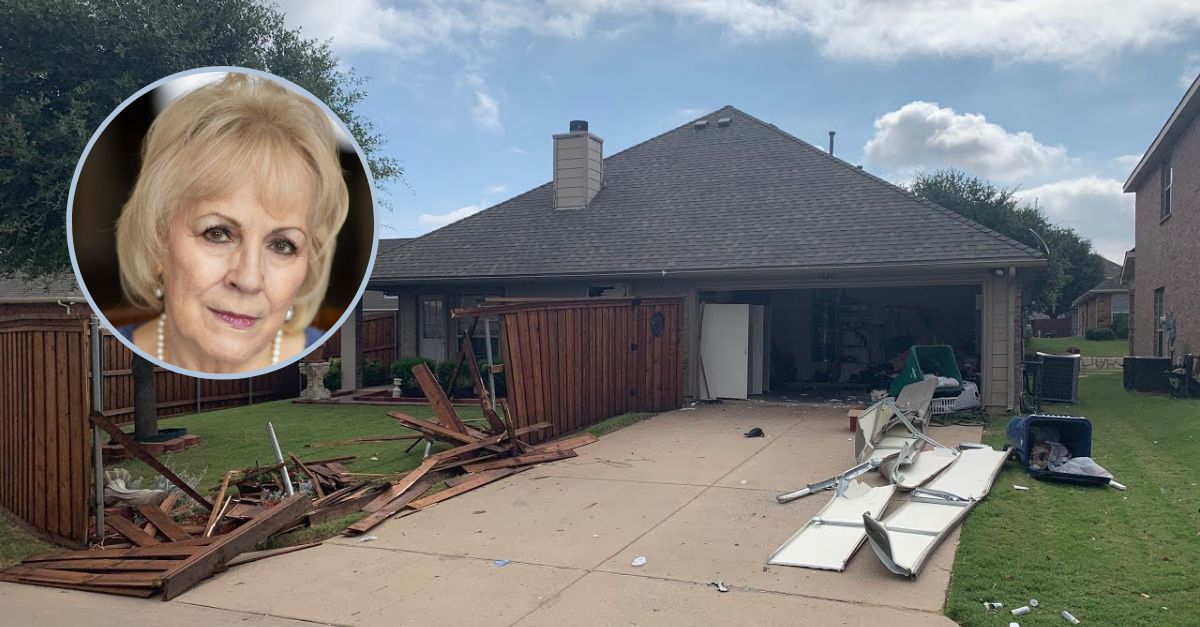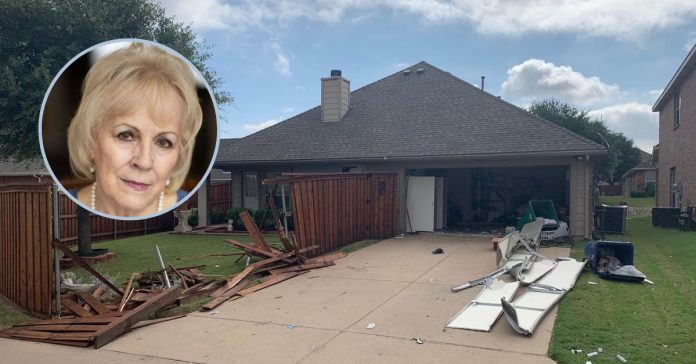
The Texas home of Vicki Baker, inset, was destroyed in a SWAT operation, and she is fighting for the city to pay for the damages. (Photos courtesy of the Institute for Justice)
Lawyers for a woman fighting to get a Texas city to pay her nearly $60,000 for damages to her home caused by a SWAT team hunting an armed fugitive is taking her battle to the U.S. Supreme Court.
Vicki Baker is planning to file a petition to get the nation’s highest court to review her case after the 5th U.S. Circuit Court of Appeals declined this week to rehear her case, her attorneys said.
“The decision not to rehear Vicki’s case is certainly disappointing, but the fact that some judges dissented provides a platform to continue fighting for her constitutional rights,” said her attorney, Jeff Redfern, with the nonprofit public interest law firm, the Institute for Justice. “The Fifth Amendment requires the government to provide just compensation when it destroys private property for a public purpose, as the SWAT team did when it destroyed Vicki’s home to get a fugitive off the streets.”
In Wednesday’s decision, 11 judges denied her attempt to have her case reheard, while six judges voted in favor of rehearing her case.
“There is no doubt the McKinney community was better off because its officers ravaged Baker’s home. But it is at least peculiar to say that because the officers’ conduct benefited the community, the community can avoid compensating Baker for the inconveniences she incurred on its behalf,” wrote the dissenting judges. “Thus, it should have been the City’s burden to establish its conduct was excepted from the strictures of the just compensation requirement.”
Baker vows to fight.
“I’m prepared to fight as long as it takes,” she said. “This case is bigger than me. It’s about ensuring all innocent people who have their property destroyed by the government have a way to be compensated.”
A city spokesperson did not immediately respond to a request for comment from Law&Crime.
As Law&Crime reported in October, the raid left her home in shambles, prompting a prospective homebuyer to walk away.
This drama began on July 25, 2020, when Baker’s adult daughter, who was at the home while Baker was away, notified authorities that a fugitive — who had done handyman work at the house but had been fired — was holding a runaway girl hostage in Baker’s house.
Police arrived, and a standoff ensued. Officers used an armored vehicle to knock the home’s fence down and smashed doors and shattered windows with tear gas canisters.
Police set up a perimeter and engaged in “loud hailing” using an intercom system. Soon after, the fugitive released the girl, who came out of the house. She told police the fugitive was in the ceiling, there were “a lot of long guns” and “some pistols,” and “he was obviously high on methamphetamine.”
The fugitive communicated to police that he “had terminal cancer, wasn’t going back to prison, knew he was going to die, was going to shoot it out with the police.”
Police used their arsenal, including toxic gas grenades, and watched the scene via a hovering drone. After a time, the drone reached a point where it could spot the fugitive, who “had taken his own life,” the court document said.
The police operation was deemed successful, and the damage was necessary to resolve the emergency, but the explosions left Baker’s dog permanently blind and deaf. A hazmat remediation team needed to be called in to clean the toxic gas from the home, and ceiling fans, plumbing, floors, and bricks needed to be replaced.
“Essentially, all of the personal property in the house was destroyed, including an antique doll collection left to Baker by her mother,” court documents said.
She filed a lawsuit in March 2021 in federal court, alleging a violation of the Takings Clause of the Fifth Amendment to the U.S. Constitution, which says private property shall not “be taken for public use, without just compensation.”
And she won. A judge ruled that the city’s destruction of Baker’s home was a “taking” and that the damage was “intentional and foreseeable,” so the city must pay “just compensation.”
But the city appealed. In a ruling then, the 5th U.S. Circuit Court of Appeals concluded that the clause did not require compensation for damaged property when it was “objectively necessary for officers to damage or destroy that property in an active emergency to prevent imminent harm to persons.”
“Baker has maintained that the officers’ actions were precisely that: necessary, in light of an active emergency, to prevent imminent harm to the hostage child, to the officers who responded on the scene, and to others in her residential community,” the ruling said. “Accordingly, and despite our sympathy for Ms. Baker, on whom misfortune fell at no fault of her own, we reverse.”
The city said then it was pleased with the federal court decision.
“The City is pleased with the federal appellate court’s decision in the Baker case. The ruling upholds a long-standing legal precedent which protects McKinney taxpayers from having to pay property damages arising from lawful police actions. The Court found that the McKinney PD did everything proper in the Baker case. At the same time, the city recognized the unique effects on Ms. Baker when it offered her the full amount of her damages. Regrettably, she rejected the city’s offer.”
Have a tip we should know? [email protected]

